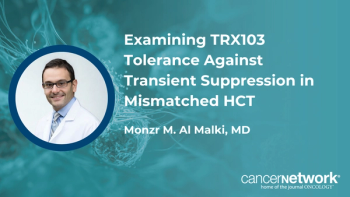
Test in Development to Monitor CML Patients Halting Nilotinib Treatment
MolecularMD and Novartis are working on a diagnostic test to help determine which chronic myeloid leukemia patients may be candidates to stop taking nilotinib.
MolecularMD and Novartis are working on a diagnostic test to help determine which chronic myeloid leukemia (CML) patients may be candidates to stop taking nilotinib, and also to monitor those patients who do stop to determine if molecular responses remain durable or not.
Glenn Miller, the chief technology officer of MolecularMD, said in a press release that the tests will be designed to “identify CML patients with minimal residual disease and provide sensitive surveillance to ensure effective monitoring of patients who achieve treatment-free remission.”
There is a growing body of literature, and a number of ongoing studies, looking into the possibility that tyrosine kinase inhibitors like nilotinib might be stopped when good responses are achieved in CML. TKIs have proven to be extremely successful drugs since their introduction, but that success means that many patients have to take the expensive drugs for years and even decades. The prospect of safely stopping the drugs is obviously appealing in that respect.
MolecularMD says it will work to validate an in vitro test used to monitor CML patients in remission. The test is based on quantitative real-time polymerase chain reaction detection of the Bcr-Abl tyrosine kinase. Novartis, the makers of nilotinib, are currently conducting a phase II clinical trial testing whether patients on nilotinib (and imatinib previously) who achieve a deep molecular response-MR4.5, specifically, which means Bcr-Abl levels at or below 0.0032%-can stop the drug safely. The new test would help with the monitoring of such patients.
Other ongoing trials in this area include one using imatinib as a maintenance therapy in patients who achieve a complete cytogenetic response on nilotinib, and another examining the effects of treatment cessation with several TKIs including imatinib, nilotinib, and dasatinib.
Some already published work has shown this to be a promising possibility. Last summer, investigators reported that 45% of a small group of patients who stopped imatinib treatment had no evidence of molecular relapse after 42 months. At 2 years post-cessation, the treatment-free remission rate was 47.1%. In another study, again it was found that not all patients relapse after stopping TKI therapy: after 12 months, 53% of the small cohort had a molecular relapse. After 24 months, that rate rose to 67%. Importantly, all the patients in that study who did relapse regained the molecular response after restarting therapy.
With that ability to regain the response, monitoring during treatment cessation-as MolecularMD’s test is intended to be used-will be key.
Newsletter
Stay up to date on recent advances in the multidisciplinary approach to cancer.










































